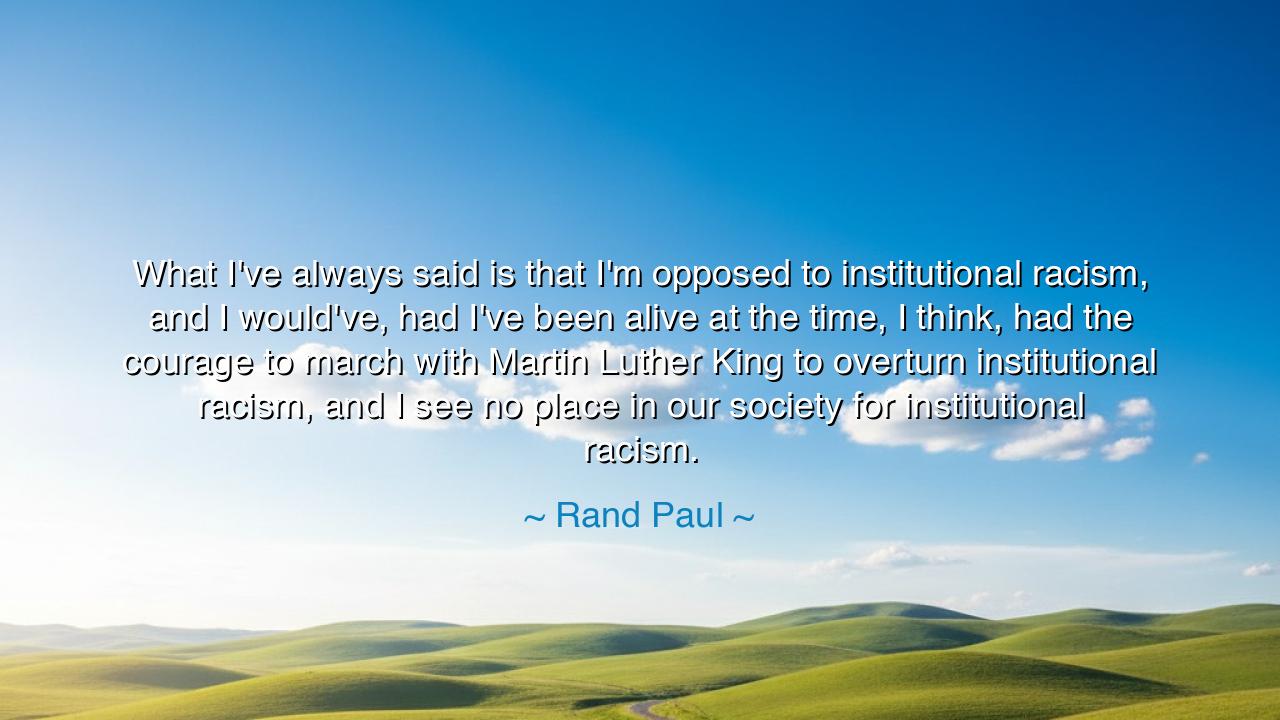
What I've always said is that I'm opposed to institutional
What I've always said is that I'm opposed to institutional racism, and I would've, had I've been alive at the time, I think, had the courage to march with Martin Luther King to overturn institutional racism, and I see no place in our society for institutional racism.






“What I’ve always said is that I’m opposed to institutional racism, and I would’ve, had I been alive at the time, I think, had the courage to march with Martin Luther King to overturn institutional racism, and I see no place in our society for institutional racism.”
Thus spoke Rand Paul, an American statesman reflecting upon one of the greatest moral struggles in the history of his nation. In these words, he aligns himself with a principle that transcends politics — the eternal stand against injustice woven into the fabric of power, what he calls institutional racism. His declaration is not simply a condemnation of prejudice, but a call to courage — to stand, as Martin Luther King Jr. once stood, for the sacred truth that freedom must belong to all or it belongs to none.
To understand the origin of this statement, we must look back to the long shadow cast by America’s history — a history marred by slavery, segregation, and the silent barriers of discrimination that continued even after the chains were broken. When Rand Paul speaks of “institutional racism,” he speaks of a system, not just an attitude: laws, customs, and policies that favored one race over another, embedding inequality into the structure of society. His words pay homage to those who fought to dismantle this system — those who marched, sang, and suffered in the Civil Rights Movement, and above all, to the moral courage of Dr. King, whose dream of brotherhood still calls to every generation.
Yet Paul’s reflection carries a deeper tone: that of personal courage. He says, “I think I would’ve had the courage to march with Martin Luther King.” These are words of humility and self-examination, for he acknowledges that such courage is not easily found. It is one thing to praise justice from the safety of hindsight; it is another to risk reputation, comfort, and life itself to stand against the tide of hatred in one’s own time. The courage to march, as he names it, is not only the courage of the legs that walk — it is the courage of the heart that believes in truth despite the noise of opposition.
The story of Rosa Parks comes to mind — a quiet seamstress who, by refusing to surrender her seat on a Montgomery bus, ignited a movement that changed the conscience of a nation. Her act was not grand in gesture, but monumental in meaning. She stood, or rather sat, with the same courage Paul invokes: the courage to defy unjust systems, to say “no” to institutions that perpetuate cruelty and exclusion. It was not a weapon that began the movement for equality — it was an act of moral resistance, born of the conviction that dignity is not given by society but bestowed by God.
By invoking Martin Luther King Jr., Paul links himself to a lineage of those who sought to transform justice from an ideal into a living reality. King’s marches were not only against segregation — they were against fear, against indifference, against the soul’s temptation to look away from the suffering of others. The struggle against institutional racism was, and remains, a struggle for the soul of humanity. Every person who joins it, in word or in deed, becomes part of that sacred tradition: the tradition of those who refuse to accept that power should ever stand above righteousness.
But Paul’s words are not only a remembrance — they are a challenge to the present. He declares that there is “no place in our society for institutional racism.” This is both a statement of faith and a demand for vigilance. For even when laws change, the human heart can still harbor prejudice, and institutions can still, quietly, reflect the injustices of the past. The work of equality is never done; it must be renewed by every generation, through awareness, compassion, and courage. To be complacent is to allow the old chains to return in new forms.
So, my child, take this teaching to heart. Oppose injustice wherever it hides — in the law, in the workplace, in the silence of bystanders, even in your own heart. Remember that courage is not born in crowds, but in conscience. Ask yourself, when you see wrong: Would I have marched with King? Then act as though the march still continues — for in truth, it does. Speak truth even when it trembles on your tongue. Defend the dignity of others as though it were your own, for it is.
And let this be the enduring lesson: that the measure of a person is not in comfort or success, but in fidelity to justice. As Rand Paul reminds us, the march for equality is not bound by time; it is the unending journey of civilization toward its better self. Walk that road with courage and with character, and you, too, shall stand among those who turned the course of history toward the light.






AAdministratorAdministrator
Welcome, honored guests. Please leave a comment, we will respond soon